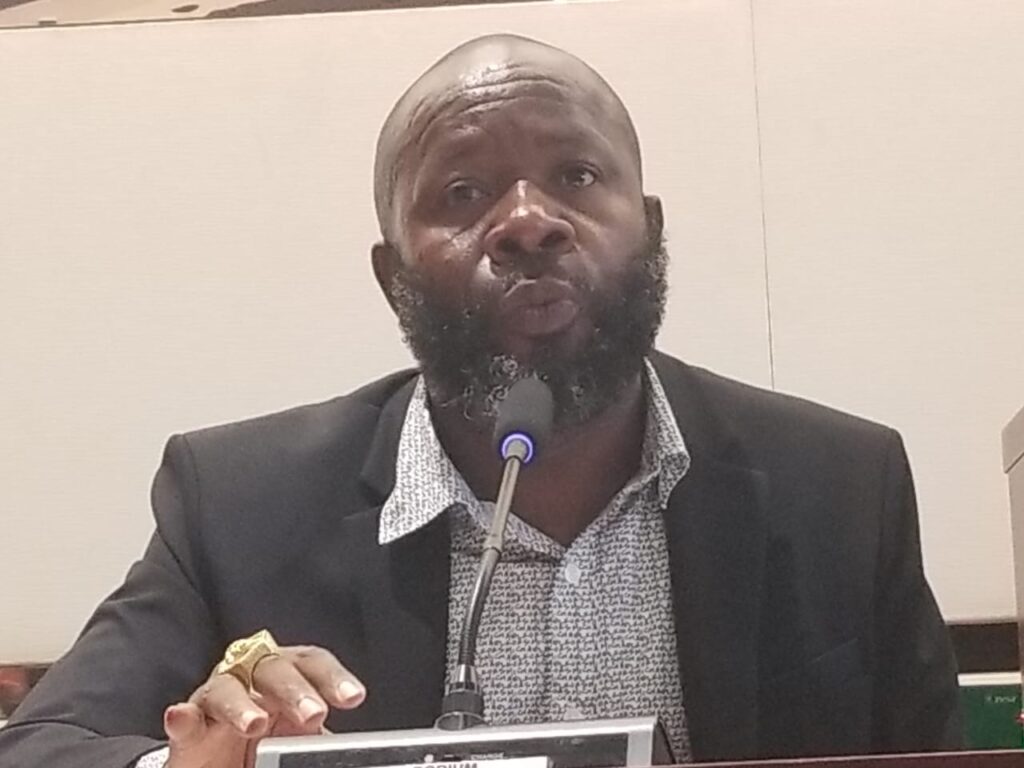By: Felton D. Clarke
01960 Peabody, Essex County, Massachusetts, United States
Introduction
Gabriel T. Montgomery, Sr., the Deputy Commissioner General for Technical Affairs (DCGTA) at the Liberia Revenue Authority (LRA), has long harbored political ambitions, specifically targeting the Grand Bassa County Senate seat in the upcoming 2029 elections. With over two (2) decades of experience within the LRA, Montgomery’s career has been marked by both professional achievements and allegations of misconduct. As the election approaches, concerns arise regarding the potential misuse of LRA resources to further his political aspirations.
Montgomery’s Tenure and Allegations of Misconduct
Montgomery’s tenure at the LRA has seen him rise through the ranks, culminating in his current role as DCGTA. However, his career has not been without controversy. While serving as a senior collector at the Liberia Petroleum Refining Company (LPRC) Tax Business Office, he reportedly earned the nickname “Rapuzee” due to alleged manipulations of the LRA Customs Systems for personal gain. Such allegations have led to perceptions of him being one of the wealthiest staff members within the LRA, second only to Senator Johnny Kpehe of Bong County, who also faced similar accusations during his tenure at the LRA.
The Intersection of Politics and Revenue Collection
Elections, by nature, are resource intensive endeavors. Candidates often require substantial funding to mount effective campaigns. In the context of Liberia, questions arise about the sources of such funding, especially when public officials like Montgomery are involved. Unlike figures such as Varney Sherman and Augustine Chea, who amassed wealth through their legal careers, or Crayton O. Ducan and Jeremiah Koung who are businessmen and real estate moguls, Montgomery’s financial trajectory is less transparent. This opacity raises concerns about the potential diversion of public resources for personal political pursuits. This is how he’s attempting.
Strategic Reshuffling Within the LRA
Following the untimely death of former Commissioner General Thomas Doe Nah in December 2023, Montgomery assumed the role of Acting Commissioner General, as stipulated by the LRA’s founding Act. In this capacity, he initiated significant personnel changes across key departments, including Legal, Management Information Systems Division (MISD), Domestic Tax, and Customs. Notably, many of these appointments favored individuals from Grand Bassa County, leading to allegations of nepotism and tribal favoritism. Such strategic placements, especially of close associates and family members in pivotal roles, have raised red flags about potential collusion and the undermining of institutional integrity.
For instance, the elevation of the Manager of the Natural Resources Tax Audit (NRTA), a kinswoman, to the level of Assistant Commissioner, and the hiring of the junior brother of his Technical Focal Point (TFP) into the Department of Domestic Tax, contravenes the LRA Act and Human Resources Management Policy Handbook. These instruments forbid the hiring of siblings and spouses to prevent potential collusion and fraud within the Authority.
Operational Concerns: NRARS, MISD and NRTA National Revenue Accounting and Reconciliation Section (NRARS):
The NRARS is tasked with liaising with the Central Bank of Liberia (CBL) to reconcile revenues collected by commercial banks on behalf of the LRA. Standard protocols mandate that funds in transitory accounts be transferred to the CBL within 24 hours. However, deviations from this practice have been observed. Reports suggest that under Montgomery’s directive, daily reconciliations have been neglected, allowing certain commercial banks to delay transfers, potentially profiting from the interim funds. Such practices not only contravene established agreements but also jeopardize the financial integrity of the LRA.
Management Information Systems Division (MISD):
The MISD plays a crucial role in the LRA’s operations, overseeing tax collections, payments, and IT infrastructure. Given its access to sensitive financial data, the division is susceptible to internal manipulations. Allegations have surfaced about MISD staff, reportedly under Montgomery’s influence, altering or deleting transaction records within systems like LITAS and ASYCUDA. Such actions can facilitate tax evasion, underreporting, and fraudulent activities, leading to significant revenue losses for the government.
Natural Resources Tax Audit (NRTA)
The NRTA of the LRA plays a pivotal role in ensuring tax compliance within Liberia’s natural resource sectors, including mining, petroleum, forestry, and agriculture. Operating under the Domestic Tax Department, the NRTS is tasked with managing taxpayers across all business sizes; small, medium, and large based on the commodities they handle, rather than their annual turnover.
As a tactical move to appease the head of the Unit for his own embellishment, Montgomery unilaterally promoted the Manager of the Unit to an Assistant Commissioner with a clear mandate to ensure that he personally clears all comprehensive tax auditsconducted before they were published. The Unit also conducts in depth audits to assess the accuracy of tax filings and payments. These audits cover all tax types and fees applicable under the Liberia Revenue Code and relevant concession agreements. Last year, reports that bribes were paid to him by Bea Mountain to alter an audit finding lingered in the press for months. Underreporting of taxable income through inflated or ineligible deductions due to failure by the NRTS to adequately scrutinize expense claims and deductions reported by companies to confirm their legitimacy and compliance with tax laws remains a huge challenge in the Unit.
Conclusion
The intertwining of political ambitions with public service responsibilities presents a complex challenge. While aspirations for higher office are not inherently problematic, the potential misuse of public resources to achieve such goals undermines institutional trust and governance. The allegations surrounding Gabriel T. Montgomery’s tenure at the LRA, if substantiated, highlight the urgent need for transparency, accountability, and robust oversight mechanisms within Liberia’s public institutions. As the 2029 elections approach, it is imperative for stakeholders, including civil society and oversight bodies, to ensure that public resources are safeguarded and that the integrity of institutions like the LRA remains uncompromised.

